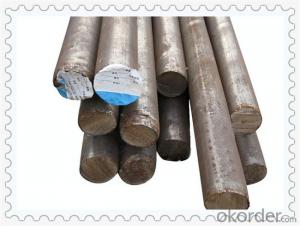42CrNiMo4 Alloy Structural Steel Round Bars
- Loading Port:
- China main port
- Payment Terms:
- TT or LC
- Min Order Qty:
- 30 m.t.
- Supply Capability:
- 10000 m.t./month
OKorder Service Pledge
OKorder Financial Service
You Might Also Like
42CrNiMo4 Alloy Structural Steel Round Bars
Product Details
Carbon Steel Round Bar | SS400, S235JR,Q235, ASTM A36, Fe360A, Fe360B,SM400A,080A15, SS41,E235B |
SAE 1020, AISI 1020, ASTM 1020, S20C, 20#, 050A20 | |
SAE 1045, AISI 1045, ASTM 1045, S45C, 45#,EN8, XC45, XC48, 45B, C45, CK45, CM45, 060A47, R683/IC45e | |
Alloy Steel Round Bar | 40Cr, DIN 1.7035, SAE 5140, AISI 5140, ASTM 5140, SCr440, 41Cr4, 530A40, 42Cr4, 40X, R683/VII3 |
SAE4140,42CrMo, 42CrMo4, DIN 1.7225, SCM440,EN19, 42CD4, 708M40, R683/II3 | |
SAE 4340, 40CrNiMoA, EN24, SNCM439, 817M40,40XMA, R683/III4 | |
SAE 8620,,AISI 8620, ASTM 8620, 20CrNiMo,SNCM220, 805M20 | |
SAE52100, AISI52100,ASTM E52100, GCr15, SUJ2, 100C6, 100Cr6, 1.3505, 534A99, IIIX15 |
Chemical composition
| Standard | Grade | C | Cr | Mo | Si | Mn | P | S | Ni | Cu |
| GB | 42CrMo | 0.38-0.45 | 0.90-1.20 | 0.15-0.25 | 0.17-0.37 | 0.50-0.80 | 0.035 | 0.035 | 0.3 | 0.3 |
| JIS | SCM440 | 0.38-0.43 | 0.90-1.20 | 0.15-0.30 | 0.15-0.35 | 0.60-0.90 | 0.03 | 0.03 | 0.25 | 0.3 |
| ASTM | 4140 | 0.38-0.43 | 0.80-1.10 | 0.15-0.25 | 0.15-0.35 | 0.75-1.00 | 0.035 | 0.04 | — | — |
| ENISO | 42CrMo4 | 0.38-0.45 | 0.90-1.20 | 0.15-0.30 | ≤0.40 | 0.60-0.90 | 0.035 | 0.035 | — | — |
Mechanical Properties
| Grade | Tensile Strength (Mpa) | Yield Strength (Mpa) | Elongation (%) | Reduction of Area (%) | Charpy Impact (J) |
| 42CrMo | ≥1080 | ≥930 | ≥12 | ≥45 | ≥63 |
Products Show
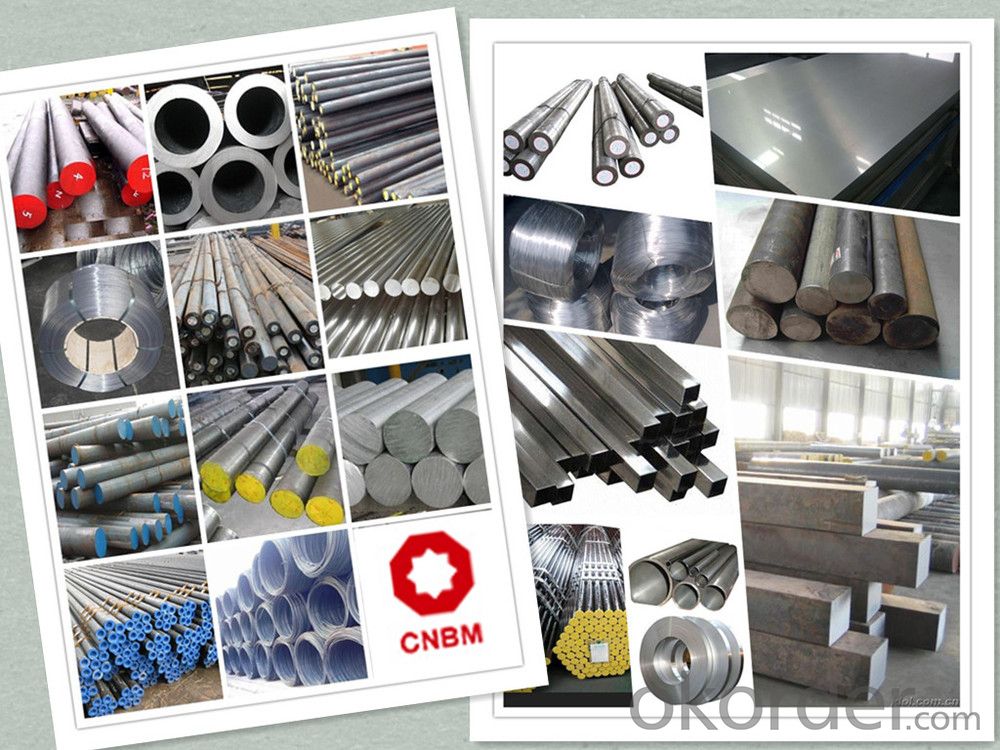
Product Overviews
| Product Name | Typical Grades | Diameter(mm) | Standard adopted |
| Carbon Steel | 20 (1020/S20C/C22) | Ø16-Ø300 |
GB/SAE/JIS/DIN
|
| 40 (1040/S40C/C40) | |||
| 45 (1045/S45C/C45) | |||
| Bearing Steel | GCr9 (51100/SUJ1) | Ø12-Ø250 | |
| GCr15 (52100/SUJ2/100Gr6) | |||
| GCr9SiMn (A485-Gr.1/SUJ3) | |||
Cr-Mo Steel | 20Cr (5120/SCr420H/20Cr4) | Ø12-Ø250 | |
| 40Cr (5140/SCr440/41Cr4) | |||
| 42CrMo(4140/SCM440/42CrMo4) | |||
| Gear Steel | 20CrNiMo | Ø16-Ø600 | |
| 20CrMn(5115/SMnC420/20MnCr5) | |||
| 20CrNiMo(8620/SNCM220/20CrMiMo2) |
Application
| Carbon Steel | Mold bottom, Plastic mold, Construction machinery parts Automobile parts, Security grills, Screens, Construction |
| Bearing Steel | Aerospace, Navigation, Nuclear energy, Chemical industry Electronic information, Petrochemical, Instrument and meter Transportation |
| Cr-Mo Steel | Mechanism & Fasteners gear, Stressed components for vehicles Engines and machines, Parts of larger cross-section |
| Gear Steel | All kinds of gears, Statically and dynamically stressed component for vehicles Engines and machine, Larger cross-section parts, Crankshafts |
Work Shop
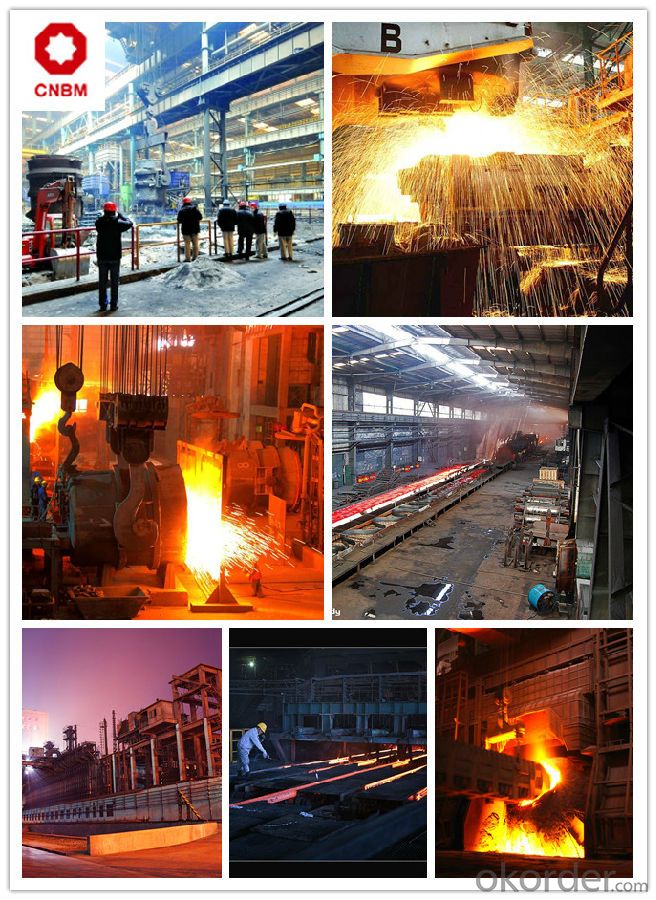
Company Information
CNBM International Corporation is the most important trading platform of CNBM group.
Whith its advantages, CNBM International are mainly concentrate on Cement, Glass, Iron and Steel, Ceramics industries and devotes herself for supplying high qulity series of refractories as well as technical consultancies and logistics solutions.

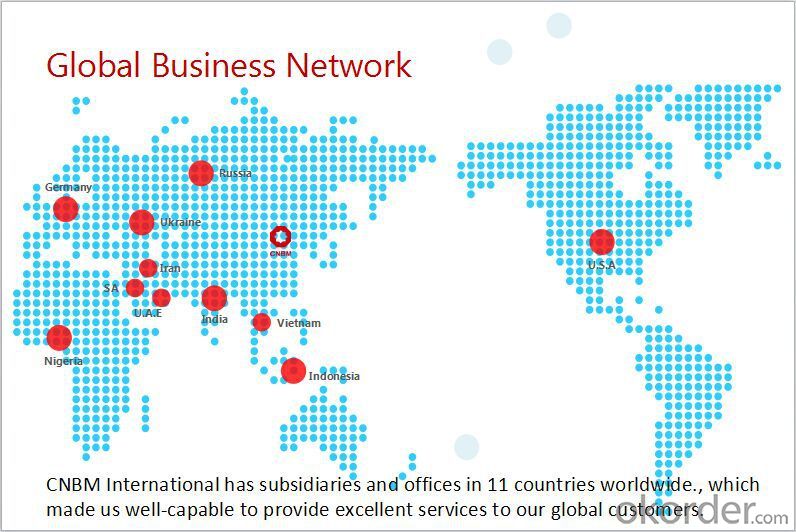
FAQ
1, Your advantages?
professional products inquiry, products knowledge train (for agents), smooth goods delivery, excellent customer solution proposale
2, Test & Certificate?
SGS test is available, customer inspection before shipping is welcome, third party inspection is no problem
3, Factory or Trading Company?
CNBM is a trading company but we have so many protocol factories and CNBM works as a trading department of these factories. Also CNBM is the holding company of many factories.
4, Payment Terms?
30% TT as deposit and 70% before delivery.
Irrevocable L/C at sight.
5, Trading Terms?
EXW, FOB, CIF, FFR, CNF
6, After-sale Service?
CNBM provides the services and support you need for every step of our cooperation. We're the business partner you can trust.
For any problem, please kindly contact us at any your convenient time.
We'll reply you in our first priority within 24 hours.
Packaging & Delivery
1, Packaging: seaworthy package or as required
2, Delivery: 35-45 days or based on quantity
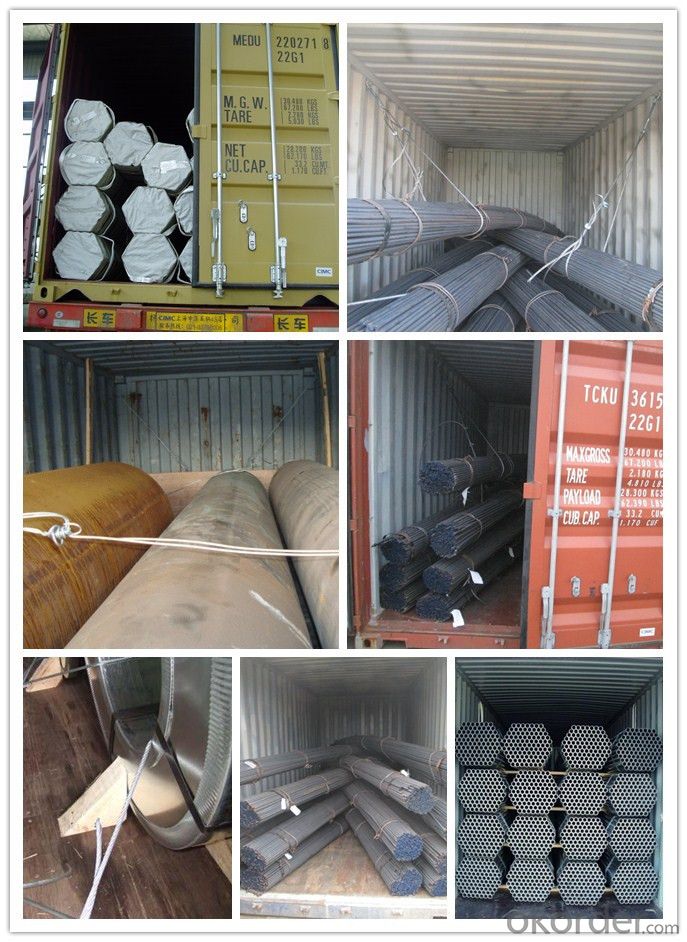
Round steel refers to the solid section for circular strip steel.Its specifications expressed as a number of mm in diameter, such as ""50"" indicates that the diameter of 50 mm round steel.Round steel hot rolling, forging and cold drawn three kinds.The specifications of the hot rolled round steel of 5.5 to 250 mm.5.5-25 mm small round steel are mostly with straight into bundles of supplies, commonly used for reinforcing steel bar, bolt, and various mechanical parts;More than 25 mm round steel,mainly used in the manufacture of mechanical parts and seamless steel tube billet.
Carbon steel according to the chemical composition (i.e., with carbon content) can be divided into low carbon steel, medium carbon steel and high carbon steel.According to the quality of the steel can be divided into ordinary carbon steel and high quality carbon steel.According to the purposes and can be divided into carbon structural steel, carbon tool steel.
The difference between the round steel and other steel: 1 appearance is not the same, round steel exterior circle of light, no lines without ribs, and other steel surface appearance has a groove or a rib, thus causing the cohesive force of small round steel and concrete, and the other the cohesive force of steel bar and reinforced concrete.2 ingredients are different, round steel (level 1) steel belong to the normal low carbon steel, more than other reinforcement for alloy steel.Three different intensity, low intensity of round steel and other steel high strength namely round steel have larger deformation before is pulled, and reinforced by other tensile deformation is much smaller.
- Q:What is a steel round bar?
- A steel round bar is a long, cylindrical metal rod with a circular cross-section. It is typically made from steel, which is a strong and durable alloy composed primarily of iron and carbon. The round bar is commonly used in various industries such as construction, manufacturing, and engineering due to its versatility and reliability. It is often used as a structural component in buildings, as support or reinforcement in concrete structures, or as a component in machinery and equipment. The round shape allows for easy handling, machining, and welding processes. Steel round bars come in various diameters and lengths, and they can be further customized or fabricated to meet specific project requirements.
- Q:What are the different types of steel round bar sizes?
- The different types of steel round bar sizes vary depending on the specific requirements and applications. Common sizes range from 1/4 inch to 24 inches in diameter. Additionally, steel round bars can be found in metric sizes, typically ranging from 6mm to 600mm in diameter. It is important to note that the availability of sizes may vary depending on the supplier and location.
- Q:What is the difference between a rough turned and a centerless ground steel round bar?
- A rough turned steel round bar refers to a steel bar that has been machined to a standard size and shape, typically using a lathe or turning machine. The process involves removing excess material from the bar's surface to achieve the desired diameter and smoothness. The resulting rough turned bar may still have slight imperfections or variations in size and surface finish. On the other hand, a centerless ground steel round bar undergoes a different manufacturing process. Centerless grinding involves feeding the steel bar through two rotating wheels: a grinding wheel and a regulating wheel. The grinding wheel removes material from the bar's surface to achieve a precise diameter, while the regulating wheel controls the bar's feed rate. This process ensures tight tolerances, excellent surface finish, and a uniform diameter along the entire length of the bar. In summary, the main difference between a rough turned and a centerless ground steel round bar lies in the manufacturing process and the resulting quality. While a rough turned bar is machined to a standard size and shape with some imperfections, a centerless ground bar undergoes a more precise grinding process to achieve a highly accurate diameter, excellent surface finish, and consistent dimensions throughout the bar.
- Q:Can steel round bars be used for making pipelines?
- Yes, steel round bars can be used for making pipelines. They are often used as the main material for pipelines due to their high strength and durability, which enables them to withstand the pressure and environmental conditions that pipelines are exposed to. Additionally, steel round bars can be easily welded together to create a continuous pipeline, ensuring a reliable and efficient transportation system for various fluids or gases.
- Q:What is the difference between a smooth and a deformed steel round bar?
- A smooth steel round bar is characterized by its consistently even surface, free from any visible imperfections or deformities. It is typically produced using the hot rolling technique, which involves heating a steel billet and passing it through a series of rolling mills to achieve the desired shape and surface finish. Smooth steel round bars are commonly employed in applications where aesthetics and surface quality are of utmost importance, such as architectural designs or decorative metalwork. Contrarily, a deformed steel round bar possesses intentional deformations or patterns on its surface. These deformations can take various forms, including ridges, ribs, or indentations. The purpose of incorporating deformations on the surface of a steel round bar is to enhance its ability to bond with concrete or other materials. The irregular surface of a deformed bar provides increased friction and better adhesion, thereby improving the structural integrity of reinforced concrete structures. Deformed steel round bars find primary use in construction projects, particularly in reinforced concrete structures like columns, beams, and slabs. The deformations on the bar's surface serve to prevent slippage between the steel and concrete, ensuring a stronger bond and enhancing the overall stability and durability of the structure. To summarize, the key distinction between a smooth and a deformed steel round bar lies in their surface characteristics and intended applications. Smooth bars possess a uniform and smooth surface, making them suitable for applications that prioritize aesthetics and surface quality. Deformed bars, on the other hand, possess intentional deformations to enhance bonding with concrete, making them well-suited for construction projects that require reinforced concrete structures.
- Q:How are steel round bars stored and transported?
- To ensure the safety and ease of handling for steel round bars, a variety of methods are employed for their storage and transportation. Typically, warehouses or outdoor yards serve as storage locations for these bars. Within these facilities, horizontal stacking on racks or placement on steel stands is a common practice to prevent any damage or deformation. It is essential to keep the bars elevated from the ground to avoid contact with moisture and potential rusting. For transportation purposes, steel round bars are often bundled together using steel straps or chains. These bundles are designed to tightly secure the bars and prevent any movement during transit. Furthermore, the bundles are frequently labeled with pertinent information such as steel type, dimensions, and weight to ensure proper identification and handling. The transportation of steel round bars can be facilitated by trucks, trains, or ships, depending on the distance to be covered. Shorter distances typically utilize trucks and trains, while ships are preferred for longer hauls, especially for international shipments. The loading process may involve flatbed trucks or shipping containers, depending on the size and weight of the bars. During transportation, it is crucial to avoid any potential impacts or mishandling that could cause damage to the bars. To achieve this, proper securing and bracing techniques are employed to minimize movement or shifting during transit. The use of blocking and bracing materials is common practice to prevent rolling or sliding of the bars. In conclusion, steel round bars are stored in warehouses or outdoor yards and bundled together using steel straps or chains. They are transported using trucks, trains, or ships, with careful attention given to securing and bracing to prevent damage. By adhering to these storage and transportation practices, steel round bars can be delivered safely and efficiently to their intended destinations.
- Q:What are the advantages of using nickel-lead alloy steel round bars?
- Nickel-lead alloy steel round bars offer numerous benefits: 1. Corrosion resistance is enhanced, making the bars suitable for use in industries dealing with harsh environments or corrosive substances. This ensures durability and reduces the need for frequent replacements. 2. The inclusion of nickel and lead enhances the strength and toughness of the bars, making them highly resistant to deformation, cracking, and wear under high-stress conditions. This allows them to withstand heavy loads and impacts. 3. Machinability is improved, enabling easy cutting, drilling, and shaping during fabrication processes. Efficient chip evacuation and reduced tool wear result in increased productivity and cost-effectiveness in manufacturing. 4. Thermal stability is excellent, making the bars suitable for high-temperature applications or extreme thermal cycling. They can withstand thermal expansion and contraction without significant dimensional changes, ensuring accuracy and structural integrity. 5. The addition of lead contributes to a low coefficient of friction, reducing wear and friction between the bars and other surfaces. This is valuable in applications where minimal wear and lubrication are crucial. 6. The bars possess good electrical conductivity, making them ideal for applications that require efficient electrical current flow, such as electrical connectors and circuit breakers. In conclusion, nickel-lead alloy steel round bars offer enhanced corrosion resistance, superior strength, improved machinability, thermal stability, low friction coefficient, and good electrical conductivity. These properties make them an excellent choice for various industries and applications.
- Q:Are steel round bars suitable for automotive applications?
- Steel round bars are an ideal choice for automotive applications. Their exceptional strength, durability, and resistance to corrosion make them a popular choice in the manufacturing of various automotive components. These components include axles, crankshafts, drive shafts, steering components, suspension systems, and chassis construction. Steel round bars possess the necessary strength and rigidity to withstand the demanding conditions of automotive use, such as heavy loads, vibrations, and impact forces. Moreover, they offer versatility and adaptability to different automotive designs and requirements as they can be easily machined, welded, and forged. In summary, steel round bars are not only dependable but also cost-effective for automotive applications.
- Q:What is the difference between a forged and a ground steel round bar?
- The manufacturing processes and resulting characteristics of a forged steel round bar and a ground steel round bar differ significantly. To create a forged steel round bar, the steel is subjected to high temperatures and then shaped using mechanical pressure, typically with a hammer or press. This process aligns the grain structure of the steel, enhancing its strength and durability. The forged steel round bars are renowned for their exceptional strength, impact resistance, and overall toughness. They find widespread use in applications that demand high strength, such as heavy machinery, automotive parts, and construction equipment. On the contrary, a ground steel round bar is manufactured using a grinding process. Once the steel is initially shaped, it undergoes precise grinding to achieve the desired dimensions and surface finish. This grinding process eliminates any imperfections or irregularities on the surface, resulting in a smooth and polished appearance. Ground steel round bars are commonly employed in applications that necessitate precise dimensions, like shafts, axles, and precision tools. In conclusion, the primary distinction between a forged steel round bar and a ground steel round bar lies in their manufacturing processes and resultant properties. The forged steel round bar offers superior strength and toughness due to the alignment of its grain structure, making it a suitable choice for heavy-duty applications. Conversely, the ground steel round bar is renowned for its precise dimensions and polished surface finish, rendering it an ideal option for applications that require precision.
- Q:What are the advantages of using sulfur-alloy steel round bars?
- There are several advantages of using sulfur-alloy steel round bars. Firstly, sulfur-alloy steel round bars offer improved machinability, making it easier to shape and cut the material into desired forms. Additionally, the sulfur content in the alloy enhances the overall strength and hardness of the steel, making it more durable and resistant to wear and tear. Moreover, sulfur-alloy steel round bars have excellent thermal conductivity, allowing for efficient heat transfer during various applications. Lastly, these bars are cost-effective as they offer a combination of desirable properties at a relatively lower price compared to other specialized alloys.
1. Manufacturer Overview |
|
|---|---|
| Location | |
| Year Established | |
| Annual Output Value | |
| Main Markets | |
| Company Certifications | |
2. Manufacturer Certificates |
|
|---|---|
| a) Certification Name | |
| Range | |
| Reference | |
| Validity Period | |
3. Manufacturer Capability |
|
|---|---|
| a)Trade Capacity | |
| Nearest Port | |
| Export Percentage | |
| No.of Employees in Trade Department | |
| Language Spoken: | |
| b)Factory Information | |
| Factory Size: | |
| No. of Production Lines | |
| Contract Manufacturing | |
| Product Price Range | |
Send your message to us
42CrNiMo4 Alloy Structural Steel Round Bars
- Loading Port:
- China main port
- Payment Terms:
- TT or LC
- Min Order Qty:
- 30 m.t.
- Supply Capability:
- 10000 m.t./month
OKorder Service Pledge
OKorder Financial Service
Similar products
New products
Hot products
Hot Searches
Related keywords
